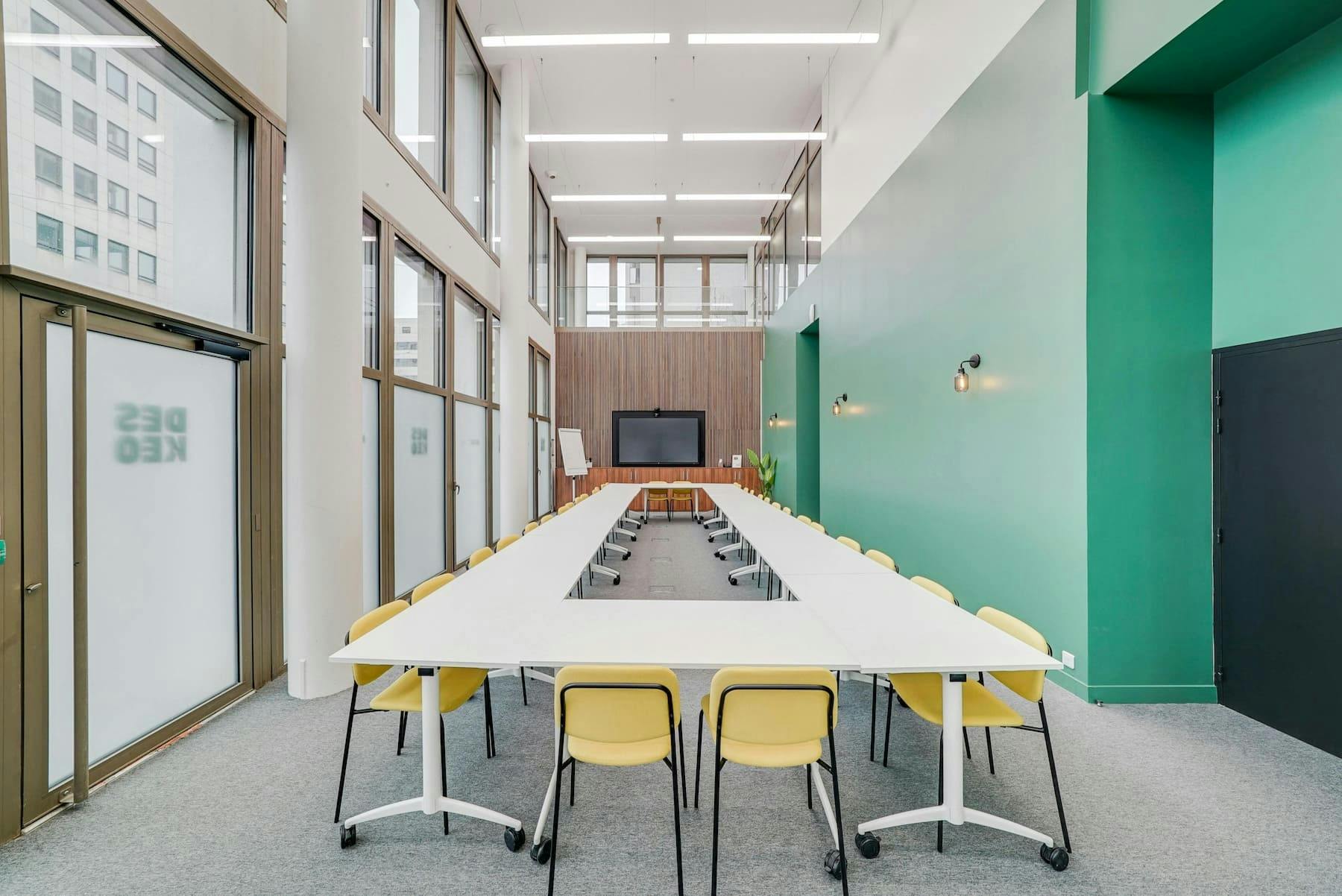

Well-being and work: our complete guide
Once considered a secondary notion, well-being at work is now a central concern for the majority of employees. They are now seeking above all a job that will allow them to flourish professionally while maintaining a balance with their personal life.
The concept of well-being at work has thus become a major issue for companies keen to attract and retain talent.
However, while the majority of them have understood that investing in the well-being of employees is a real lever for sustainable performance, some are wondering how to implement a company policy concerned with the well-being of their employees.
Deskeo will therefore explain in detail what well-being at work is in order to understand its challenges and to discover the best practices to establish it sustainably in your company.
How to define well-being at work?
Before considering concrete actions in favor of well-being at work, it is essential to fully understand this multifaceted concept. What exactly do we mean by "well-being at work"? What are its fundamental pillars? This is what we will explore together.
Definition of well-being at work
Well-being at work is defined as a state of overall satisfaction and fulfilment of employees in their professional environment.
It is based on three complementary dimensions:
- Physical and mental health: employees must work in healthy and safe conditions that preserve their physical integrity and psychological balance.
- Motivation and engagement: a fulfilled employee is an involved employee, who finds meaning in their tasks and feels recognised for their contribution.
- Work-life balance: well-being at work also involves the ability to harmoniously balance professional responsibilities with private life.
In simple terms, well-being at work is a holistic concept that goes far beyond mere risk prevention. It is about creating an environment and corporate culture conducive to individual and collective fulfilment. And you will see that while this can be beneficial for your employees, it can also be beneficial for your company.
Well-being at work: why is it so important?
Long considered secondary, well-being at work is now a strategic priority for companies because it helps to:
- Increase productivity and performance. Fulfilled employees are more motivated, more creative and more efficient in their daily work.
- Reduce turnover and absenteeism, two phenomena that can be very costly for organisations. Employees who feel good are also more loyal and more loyal to their employer.
- Foster team cohesion. By creating the conditions for a positive and caring work environment, communication, mutual aid and synergy between employees are encouraged.
The benefits of well-being at work are therefore numerous and prove that it is not just a passing trend, but indeed a sustainable investment, which benefits both employees and the company.
And at Deskeo, we understand this well. That's why we do everything to make your employees feel good in our offices and provide you with optimised workspaces with ergonomic and pleasant desks.
But good furniture alone does not suffice to create an optimal well-being climate at work.
How can you implement well-being in your company?
As you will have understood, well-being at work is not optional. Therefore, you must work to establish it sustainably. This notably involves creating pleasant offices to work in.
Improving workspaces
The layout of the workspace plays a crucial role in employees' well-being. A workspace with white walls, desks, and chairs will not suffice to ensure the well-being of your employees.
Yes, ergonomic desks, lighting, acoustics, office layout... Every detail counts and contributes to the overall comfort of employees.
It is therefore important to be able to offer your employees a workspace that adapts to their needs. This is why Deskeo provides you with modular workspaces with desks designed for user comfort.
Instilling well-being through plants
Integrating plants into a workspace may seem like a trivial decorative touch, yet it is far from insignificant.
Indeed, beyond their decorative aspect, plants help improve the ambient air quality, and also create a more pleasant and soothing atmosphere.
Installing plants in your offices will therefore help to improve your employees' health, reduce stress, increase creativity, and even boost productivity.
But be careful, while offering a healthy and fulfilling work environment is an essential first step towards employee well-being, other factors also come into play to anchor this culture sustainably.
The main factors of well-being at work
Beyond the walls, well-being at work is based on a set of human and organisational factors. Here are the main levers to activate to develop it.
A favourable work environment
As we have already seen, the work environment plays a crucial role in your company's productivity. Employees who are comfortably seated at their workstations and have all the necessary equipment will indeed do better work than poorly seated employees with low-quality equipment.
This is precisely why Deskeo workspaces strive to offer a pleasant, stimulating, and well-arranged professional setting, where it is enjoyable to work and collaborate.
Work-life balance
Today more than ever, employees are looking for companies that allow them to find the right balance between professional and private life.
To promote this balance, several avenues exist:
- Offering flexible hours and telecommuting.
- Respecting the right to disconnect.
- Being attentive to each person's personal constraints.
- Offering flexible workspaces.
Once again, the flexible workspaces of Deskeo can be an interesting solution because they allow employees to adapt their place and hours of work according to their needs.
Communication and support
Finally, communication and support are two fundamental pillars of well-being at work. Employees need to know that their mental health is taken into account and feel listened to, supported and valued on a daily basis.
This means multiplying opportunities for exchange (individual meetings, team meetings, social moments, collective activities...), but also establishing a culture of kind and constructive feedback.
Every employee should be able to:
- express themselves freely,
- share their difficulties,
- and find support when needed.
The collaborative and flexible workspaces of Deskeo precisely promote these positive interactions by creating environments conducive to exchange and team cohesion.
Two strategies to promote well-being at work
Now that we have reviewed the main factors of well-being at work, it is time to see how to put them into practice. Deskeo therefore reveals two complementary strategies to firmly anchor well-being in your company culture.
Creating a healthy and positive work environment
The first step is to create a work environment that is conducive to well-being, both physically and psychologically. This involves:
- Ergonomic and comfortable offices, designed for the well-being of users, such as those offered by Deskeo.
- A caring and inclusive company culture, that values diversity and everyone's expression.
- Management based on trust and empowerment, which gives a large place to autonomy and initiative.
- Regular social moments and team-building activities, to strengthen team cohesion and synergy.
The goal is to make the workplace an enriching space, where it is good to live and collaborate on a daily basis. And Deskeo's flexible design solutions fully align with this approach by offering flexible and inspiring work environments.
Developing a stress management policy
Stress is one of the main obstacles to well-being at work. To prevent and reduce it, it is therefore essential to establish a real stress management policy.
This can be structured around several axes:
- Training on time and priority management, to help employees better organize their workload.
- Relaxation and mindfulness workshops, to learn how to manage stress and emotions.
- Psychological support available for employees who feel the need.
- Raising managers' awareness of psychosocial risks and warning signs.
While these axes are extremely effective, they do however require suitable places and equipment to be implemented optimally (meeting rooms, relaxation areas…).
And, once again, Deskeo is here with its flexible offices and relaxation areas that offer a conducive environment for disconnection and relaxation.
In short, well-being at work is a multifactorial issue that requires a comprehensive and structured approach. By combining suitable workplaces with a caring company culture, it is possible to create an enriching environment where every employee can give their best.

Contact Us
We find your Perfect fit!

